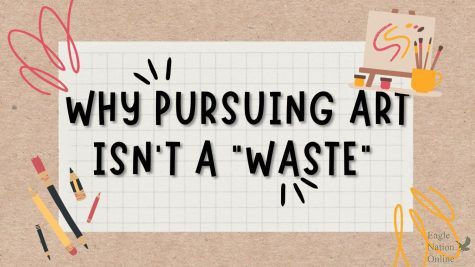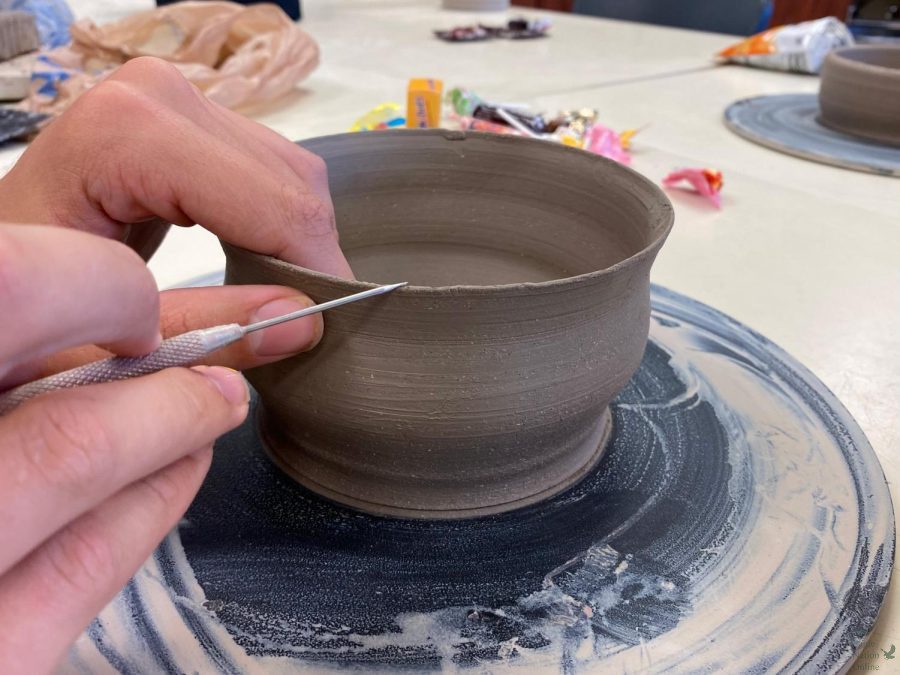Editorial: Why pursuing art isn’t ‘a waste’
Writer shares insight on why art careers should be more valued.
Hands fixed around his self-made bowl, senior Cameron Youtsey flattens the edges of his clay. “This class gives me a creative outlet,” Youtsey said. “Where I can construct pieces to model my creativity.” Taught by Brian Pierce in room 1037, ceramics allows students the chance to construct their own 3D models from clay, including bowls, vases, boxes, and more.
November 1, 2022
After mentioning that the career someone wishes to pursue falls under the wide umbrella of art, they may have been met with a response along the lines of “Are you sure you want to do that with your life?” Despite the incredible amount of time that many people in the field of art put into their work, a majority of the public still views art as “not a real job.” Despite these negative views on pursuing art, it is far from a waste.
“But, it’s a risky career choice!”
Yes, a career in art may be considered risky. Parents of children who want to pursue art may worry about the fact that many well-known artists’ works did not receive praise or value until after their deaths (Vincent Van Gogh, Paul Gauguin, Henry Darger, etc.). However, “art” is much more than painting. When people say they want to pursue art, they don’t always mean that they just want to paint. Some people may, but other careers in the art field include graphic design, animation, illustration, art director positions – and so many more. In fact, employment in the graphic design field is up 3%.
Without anyone taking a risk to pursue art, our society would not have the beauty and the insight we have. Imagine a world without pictures in children’s books, no logos for business, and no animated characters to love. It can be difficult to make a lot of money as an artist, but it is not impossible. If no one ever took a risk for a career, society would not be as advanced as it is now.
“You’re wasting your time and money getting a degree in art.”
The stigma surrounding a career in art is that with an art degree, you can’t do much. This is false. Sometimes the usefulness does depend on what type of art is studied, but art is far from a waste of time. Aside from the opportunity for many different fields in art, studying its varied applications actually improves skills. Art allows people to express themselves, work with others, and learn about themselves. People who study art are able to get jobs. Once again, it is not impossible.
For example, the Savannah College of Art and Design, abbreviated to SCAD, has a 99% employment rate after graduation. SCAD provides more than 100 degree options and more than 75 minors and certificate programs. SCAD is an art school, but because of the information and broad education they provide for their students, their students have a high rate of employment and internships.
Every logo or infographic you see is made by an artist. Many people put hours upon hours of work into art. Hard work is never “a waste.” Saying that a career in art is, undermines the hard work of so many people in the field. The education of art does take many hours and an incredible amount of hard work. Spending time studying a field in order to pursue a career should not be considered a waste of time, especially because of how many potential careers that education in the field offers.

“What if they realize they want to pursue something else after studying art in college?”
Career changes do provide legitimate obstacles, however, this concern could really be applied to any field of study. What if students go to school to become a doctors, but then they decide to do something else? People make changes to their lives all of the time. Not everyone knows exactly what they want to do right when they go to college. Some do, and that’s great, but change is inevitable in life. A career can change. It is not just people who pursue art who may realize they want to do something else. Reportedly 50-75% of students change their major, a change in a decision is not uncommon for any field of study, not just art.
Art provides skills and abilities needed throughout business
Aside from having a technique for drawing and painting, and improving creations, going into art provides other areas for development. Studying art can help a student develop skills that employers like to see, including communication, collaboration, innovation, and problem solving. Those who pursue an education in art also have an opportunity to show an understanding of deadlines. Multiple art-related studies require deadlines and grade-based effort in lower levels and quality and creativity in higher levels. This replicates the environment of many jobs. An employee often receives a project assignment and has to complete it by the deadline. This occurs in both the art world and the world of other jobs. Sometimes the person giving a deadline is a boss. Sometimes time constraints come from clients.
No matter who needs work completed, having respect for deadlines stays immensely important. Students in art also develop a sense of creativity. Since art is how people express themselves, creating art-based expressions of feelings, beliefs, and experiences, not only heightens a person’s creativity but also keeps them more in touch with their life values.
Overall, art is NOT a waste of anyone’s time, money or effort. Society needs to acknowledge the benefits of pursuing art careers – and art itself. Creativity provides people with a way to express themselves. Art has proven its importance to the world. Art careers not only deserve more recognition for the good they bring society, but artists themselves deserve respect for their contributions to a world that often needs more beauty.


























